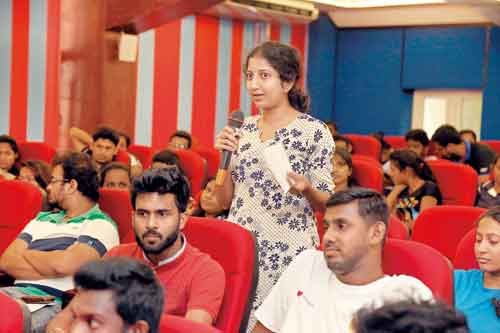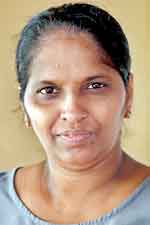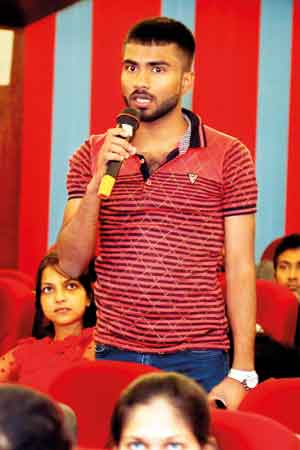Uni students as agents of change

Speaking up: Frank and open were the discussions where university students aired their views (above and below). Pix by M.A. Pushpa Kumara
Not mere platitudes or lip service but concrete action is what the University Grants Commission (UGC) has been dishing out along with its academic content to all of the 15 state universities spread across the country.
With a sharp spotlight on gender equity and equality and ragging, the zero-tolerance policy against ragging and sexual and gender-based violence within the universities, both among students and staff, is being strengthened.
A 24-hour Call Centre with the hotline: 011-2123700 has been set up at the UGC and an Online Complaints Mechanism launched for incidents of ragging, harassment, intimidation and bullying, with the assurance of utmost confidentiality and prompt investigation.
Using modern technology to the maximum, an Emergency Safety Mobile App is to be introduced shortly for students and teachers. Developed by the Information and Communication Technology Agency (ICTA) in collaboration with the UGC, this App is being piloted at the Uva-Wellassa University. It will allow a student or a teacher at the press of a button to alert certain specified personnel of their university of an emergency situation with a map indicating the location of distress.
What has been ‘going on’ within the universities since 2015 under the dynamic guidance of the UGC headed by Prof. Mohan de Silva and through its Centre for Gender Equity and Equality (CGEE) whose Director is Emeritus Prof. Uma Coomaraswamy is demonstrated at the three-day ‘Journey Towards Gender Equity/Equality: An Inter-University Festival’ at Kelaniya which was concluded on Thursday.

Dr. Anusha Edirisinghe
Different halls in different blocks on the sprawling campus that is the University of Kelaniya were buzzing when we arrived there on Wednesday morning with enthusiastic volunteers pointing the way. Student groups from 14 universities have converged on Kelaniya to share the warm hospitality of this university.
Vocal and vibrant is the discussion in all three languages of English, Sinhala and Tamil on the ‘Introduction to Gender’ by Prof. Kamala Liyanage and Ms. Vasuki Jeyasankar in one hall attended by a large number of students.
Ranging from stereotypical roles assigned to men and women as breadwinners and home-makers, the topics covered were wide and varied…….how women themselves will serve pieces of fish to their husbands and sons, leaving only the hodi (gravy) to their daughters and themselves; how mothers-in-law keep their sons on a pedestal, putting down their daughters-in-law; how mothers insist on the daughters seeking permission for something or another from their fathers and bowing to those decisions even if they disagree; how female university students have curfews and gate-passes in their hostels but not male students; why it is mostly women who are sexually harassed or face unspeakable crimes such as rape.
Thrown open for discussion was whether child-bearing is just a woman’s responsibility and duty or a national responsibility and duty and what happens if women marry but decide not to have children. Stemming from an example cited by an IT student of a workplace asking whether an interviewee has plans of marriage and starting a family in the next five years which would seal her fate whether she gets the job or not, it was made clear by the moderators that child-bearing is a national responsibility, that is why maternity leave and work adjustments for breast-feeding are national decisions. If women decide not to bear children, the country’s structures would collapse – there would be no people in all spheres be it farming, fishing, medicine, engineering etc to take the country forward.
The hostel curfew for girls was discussed at length. This was because there are chain-snatchings, “grabbings” and other stuff happening to girls. A visiting American professor had asked a very relevant question: Who does this? Girls or boys? When the answer was that boys are doing this to girls, her follow-up question had been: Then why not gate the boys and place them under curfew?
Experiences were related of how even university lecturers would bring their 12 or 13-year-old sons as chaperones when attending parties at night because in patriarchal Sri Lanka, men are supposed to be the protectors.
 Going from thoughts that not only men but also women should be able to propose marriage to someone they love, the discussions covered uncomfortable dress codes of Muslim women and how even as little children, girls are not allowed to whistle or climb trees in villages which, however, seems to be changing in current society. Debate they also did why no women or non-Buddhists can serve as high-level public servants in the specific Kandy areas where the Perahera is held even though it was a woman who brought Lord Buddha’s Tooth Relic hidden in her hair to Sri Lanka.
Going from thoughts that not only men but also women should be able to propose marriage to someone they love, the discussions covered uncomfortable dress codes of Muslim women and how even as little children, girls are not allowed to whistle or climb trees in villages which, however, seems to be changing in current society. Debate they also did why no women or non-Buddhists can serve as high-level public servants in the specific Kandy areas where the Perahera is held even though it was a woman who brought Lord Buddha’s Tooth Relic hidden in her hair to Sri Lanka.
The issues faced by single women at whom society looks at with a vapara (squint) eye and men think are easy to get, the white cloth symbolizing the virginity test still practised by many, dowries, why children should take only the wasagama (surname) of the father and not the mother, why the chief householder is always supposed to be a man and women being powerless in politics were also discussed extensively.
The focus turned on sexual exploitation at universities with all “types” of “temporary” love blooming – ‘assignment love’ where the girl is expected to write up the assignments of the boy, ‘buth love’ where the girl prepares a packet of rice for the boy daily, but never the other way round and ‘sira love’ (serious love).
In a different hall, meanwhile, Emeritus Prof. Uma Coomaraswamy brought the staff and focal points of the universities up to date on what the UGC’s CGEE has been doing. Giving the background, she says that in 2015, the UGC Standing Committee for Gender Equity and Equality was set up with the goal of promoting gender equity/equality in Sri Lankan universities by giving policy direction to establish gender-sensitive university cultures and university environments which allow students and staff inclusive of academic, administrative and support, to pursue their work without oppression and discrimination.
The CGEE established last year is the operational unit. Already a Grievance Redress Mechanism including the hotline and portal for complaints has been set up along with a robust Investigation Mechanism; encouraging universities to develop their own measures to prevent ragging and gender-based violence and provide prompt redress; and ensuring that the UGC functions as a Preventive, Oversight and Appeals Body for ragging and gender-based violence.
In November last year, a high-powered, multi-level Task Force to Prevent and Eliminate Ragging in Universities was also established.
As we leave Kelaniya it is obvious that the programmes are providing much food for thought for this crucial set of people as they get back to their universities, homes and communities. As the Director of the Centre for Gender Studies, Kelaniya, University, Dr. Anusha Edirisinghe, underscores these are “katha nokarana, namuth katha kalauthu deval.” (These are topics not discussed but which need to be discussed.)
The hope is that as these university students and staff step out into Sri Lankan society, they will be the agents of change the country sorely needs in ensuring equity, equality, justice and fairplay for all, where everyone can live in safety and with dignity.
| Mapping out the ‘Journey Towards Gender Equity/Equality: An Inter-University Festival’ | |
| ‘Journey Towards Gender Equity/Equality: An Inter-University Festival’ was launched last year (2017) with the objective of initiating spaces for the empowerment of the university community on the issue of gender and spaces that could provide learning opportunities on various aspects of gender equality as well as to express voices for change through creative activities, says the Director of the Centre for Gender Studies, Kelaniya University, Dr. Anusha Edirisinghe. While Phase 1 held in May last year at the Eastern University empowered university students and staff on gender concepts and issues; Phase 2 in November at the Peradeniya University covered the training of student-teams from all 15 universities through arts and the performing arts on themes identified by them related to gender issues. This week as Phase 3 saw hectic activity of workshops, a film screening and panel discussion chaired by filmmaker Anomaa Rajakaruna and rehearsals, the culmination on Thursday was students using their creative skills in drama, dance, song, short-films, posters and more to promote the concepts of gender and gender-based issues, firstly for schoolchildren in the morning and then for a distinguished audience in the evening. The audience included UGC Chairman Prof. Mohan de Silva; UGC’s Gender Standing Committee Co-Chair Prof. Kumudu Wijewardene; UGC’s CGEE Director Prof. Uma Coomaraswamy and Kelaniya University Vice Chancellor Prof. D.M. Semasinghe and Deputy Vice Chancellor Prof. Lakshman Senevirathne. Calling the events “significant”, Dr. Edirisinghe paid tribute to the students who had shown their prowess in dealing with gender issues in a creative manner. Touching on the Kelaniya University’s Centre for Gender Studies, she said that it was founded on the simultaneous conceptualization of gender equity/equality. “This means that both the similarities of men’s and women’s life experiences as well as the differences in their life experiences are taken into account in conceptualizations and discussions about gender.” Since its inception in 2011, the centre has been able to create a platform for engagement on issues pertaining to gender equity and equality inside and outside the university space, said Dr. Edirisinghe, adding that a clear pathway was paved by its Founding Director Prof. Maithree Wickramasinghe and the next Director Dr. Sagarika Kannangara. Students and teachers from Kelaniya, Colombo, Moratuwa, Sri Jayewardenepura, Peradeniya, Jaffna, Rajarata, Ruhuna, Sabaragamuwa, Eastern, Southeastern, Uva-Wellassa, Wayamba, Visual and Performing Arts and Open Universities and also the Institute of Swami Vipulanand and Sripalee College took part in the festival. |


